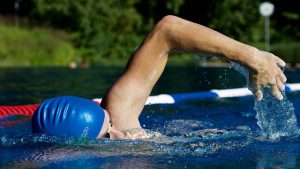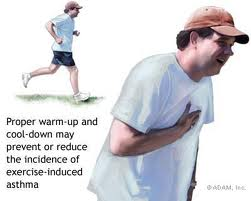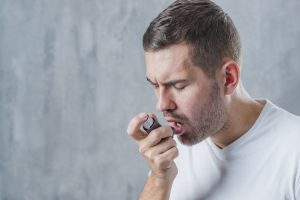- Asthma is on the increase and it is estimated that 300 million people worldwide have asthma.
- Physical activity is an important aspect of life but people with asthma often restrict their physical activities. Children with asthma often stay in the library or homeroom while the rest of the class is on playground. Few people are more prone to get an Asthma. For example, if one of parents have asthma, person will be more likely to get it. If one has allergies, one is more likely to develop asthma but not vice versa.

- With proper management the patient can have a NORMAL, HEALTHY LIFESTYLE, which includes even sports activities such as running and other exercise.
- Asthma triggers during exercise should be avoided and the activities that are good and healthy for the patient can and should be taken up.
Symptoms and Signs –
The signs of childhood asthma can vary from a cough that may last for days or weeks to sudden and scary breathing emergencies. Common symptoms include…
- Cough mostly at night
- A wheezing or whistling sound, especially when breathing out
- Trouble breathing or fast breathing that causes the skin around the ribs or neck to pull in tightly
- Frequent colds that settle in the chest.
- Child may have only one of these symptoms or several of them.
- In addition, symptoms might get worsened when child is around asthma triggers, such as smoke or strong odors or allergens like pollen, pet dander or dust mites.
Diagnosis –
- History and clinical examination
- Blood test
- Spirometry or Pulmonary Function Test
- At International sports event, usually positive bronchodilator response or a positive response to Exercise Induced Asthma test or another test of bronchial responsiveness
Treatment and Management –
With the right treatment, child can sleep through the night, avoid missing day care or school and breathe more easily. The treatment plan should help you determine when your child’s asthma is under control, when you need to change medicines and when emergency help is needed.
Child’s treatment will depend on the severity and frequency of their symptoms. To deal with childhood asthma, your allergist may prescribe two types of medicines:
- Quick relief: Any child who has asthma needs a quick-relief medicine to treat the noisy part of the disease – coughing, wheezing and shortness of breath or an asthma attack. This medicine (typically an inhaler) should always be with your child for use at the first sign of symptoms.
- Long-term control: This type of medicine is needed by some children to treat the quiet and dangerous part of asthma – the inflammation of the airways. This medication is taken daily to prevent asthma symptoms and attacks.
Children with asthma should also get a flu shot each fall. Even though the injected version of the vaccine contains a very small amount of egg protein, it is safe for kids who have egg allergy.
Child with Asthma and Daily routine –
- Inform staff at child’s school to make sure they are aware of your child’s treatment plan and that they know what to do if your child has an asthma attack.
- The school should keep a supply of certain asthma medications in the healthcare assistant’s office, if possible.
- Involve teachers, coaches and other caretaking adults in the plan. Inform child about the asthma plan for school and for other places where the child spends time without you.
- Educate child what to do if he/she gets an attack of asthma, if they get exposed to allergens or other triggers or if they forget their medicine.
- Allergies and asthma can very well be controlled with Doctor’s treatment and child will emerge, active and will be living best life!
What sports are best suited for people with asthma? What sports are not?

- Swimming is one of the best exercises for those with exercise-induced asthma. Breathing the usually warm, humid air prevents cooling and drying of the airways.
- Sports with rest periods are preferable. Tennis, golf, baseball, and volleyball are among the sports meeting this description. The resting periods allow the airways to recover, which usually prevents the onset of exercise-induced asthma.
- Rapid breathing of cold, dry air is a potent stimulus of bronchospasm in asthmatic patients. Therefore, outdoor winter sports, such as skiing, may be the most problematic. It is best to choose a sport that does not require continuous vigorous outdoor exercise such as running, bicycling, or cross-country skiing. However, several international players, athletes have successfully competed and won medals with their medical conditions of EIA -Exercise Induced Asthma or Allergic Asthma, by keeping it under control. International sportspeople like David Beckham (Football), Jackie Joyner-Kersee (Basketball and Track athlete),Greg Louganis (Diving),Paula Radcliff (Athlete and marathon runner),Jerome Bettis (Football),Peter Vanderkaay (Swimming),Amy Van Dyken (Swimming),Tom Dolan (Swimming) and Indian sportspersons named Parupalli Kashyap (Badminton), Anju Bobby George (Long Jump) are the sports legends who conquered Asthma and went on winning spree.
To stay active with asthma some of the following steps may help –
- Make sure that your asthma is under good control before you begin exercising. Refrain from exercise and consult your Doctor if your asthma is poorly controlled.
- Identify your exercise-induced asthma triggers with the help of your Doctor and try to avoid triggers.
- Avoid asthma triggers, such as smoke or strong odors or allergens like pollen, pet dander or dust mites.
- Take your pre-treatment asthma medicine.
- Avoid exercising in cold, dry air and on smoggy days.
- Covering the mouth and nose with a scarf in cold weather can be helpful.
- Warm up before exercise
- End with a cool-down exercise.

If symptoms occur with normal or intense physical activity –
- Slow down exercising.
- If symptoms persist/ get worse, then use the quick-relief medicine like inhaled bronchodialators .

- If the breathing is limiting the ability to exercise, consult your doctor.
Conclusion –
The bottom line is that Asthma can not limit you from playing sports or doing exercise. In fact, regular exercise will not only increase endurance capacity but also help in gaining confidence. Sportspeople with Asthma have given an outstanding and one of the finest performances in the world….so Who is stopping you! Asthma cannot stop you……
- ALLERGY, ASTHMA AND SPORTS …. - August 17, 2020
- KNOW ABOUT ALLERGIES - July 27, 2020
- Health Insurance – Do we really need it? - July 17, 2020


 Please wait...
Please wait...